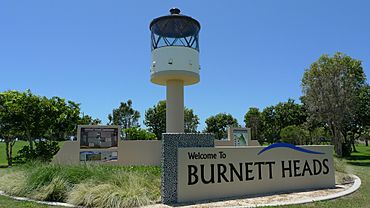Burnett Heads, Queensland facts for kids
Quick facts for kids Burnett HeadsQueensland |
|||||||||||||||
|---|---|---|---|---|---|---|---|---|---|---|---|---|---|---|---|

Entering Burnett Heads
|
|||||||||||||||
| Population | 2,908 (2021 census) | ||||||||||||||
| • Density | 164.3/km2 (426/sq mi) | ||||||||||||||
| Postcode(s) | 4670 | ||||||||||||||
| Area | 17.7 km2 (6.8 sq mi) | ||||||||||||||
| Time zone | AEST (UTC+10:00) | ||||||||||||||
| Location | |||||||||||||||
| LGA(s) | Bundaberg Region | ||||||||||||||
| State electorate(s) | Burnett | ||||||||||||||
| Federal Division(s) | Hinkler | ||||||||||||||
|
|||||||||||||||
Burnett Heads is a lovely coastal town in Queensland, Australia. It's part of the Bundaberg Region. In 2021, about 2,908 people lived there. This town is known for its beautiful coastline and its important port.
Contents
Where is Burnett Heads?
Burnett Heads is right where the Burnett River meets the big blue Coral Sea. The river is on its west and north sides. The ocean is mostly on its east.
The land here is used for homes, especially near the beach. There's also the Port of Bundaberg, which is a busy industrial area. Some land is used for farming, mainly growing sugarcane. You might even see special cane tramways that carry the harvested sugarcane to the Millaquin sugar mill for processing.
A Look Back in Time
Burnett Heads has a long history.
Early Days and Schools
- In 1862, a large area called Barolin run was leased by Alfred Henry Brown.
- The first school, Burnett Heads Provisional School, opened on April 3, 1878.
- It became Burnett Heads State School on September 17, 1888. It's still open today!
Growing Towns
- In 1883, land was sold for two new towns: New Bundaberg and Barolin Marine Township Estate.
- These two areas eventually became what we know as Burnett Heads today.
- Back then, there was a lighthouse, a pilot station, and a telegraph office at South Head.
Churches and Community
- Methodist church services were held at the school until a new Methodist Church opened in 1903.
- The Burnett Heads Post Office opened around 1919.
- In 1931, a new Roman Catholic Church was built. It was paid for by the Zunker family to remember their parents. Over 1,000 people came to the opening!
- In 1939, the St John the Divine Anglican Church started being built. The land for it was given by Christian Mittleheuser.
The Port's Importance
- The Port of Bundaberg was set up at Burnett Heads in 1958.
- This was to help the sugar industry and handle bigger ships.
- The port had been in Bundaberg town before, but moving it here made it much better.
- In 2001, a big project made the river deeper so even larger ships could come in.
Who Lives in Burnett Heads?
In 2021, about 2,908 people called Burnett Heads home.
- In 2016, 3.8% of the people were Aboriginal and Torres Strait Islander.
- Most people (80.5%) were born in Australia.
- The next most common country of birth was England (4.0%).
- Most people (91.9%) spoke only English at home.
- When it came to religion, many people said they had no religion (31.0%). Other common religions were Anglican (22.5%), Catholic (16.3%), and Uniting Church (7.7%).
Local Landmarks
The most famous landmark in Burnett Heads is its old timber lighthouse.
- It's called the Old Burnett Heads Light.
- It was built way back in 1873.
- It used to stand at the entrance to the Burnett River.
- In 1971, a new, modern lighthouse replaced it.
- But don't worry, the original lighthouse was saved! It was moved to a local park off Mittelheuser Street.
- It still has its original special Fresnel lens inside, which helped make the light shine far.
What Happens at the Port?
The Port of Bundaberg is a very important part of Burnett Heads. It's run by Gladstone Ports Corporation.
- It has two main wharves (docks).
- The Sir Thomas Hiley Wharf handles sugar, gypsum, wood pellets, and other liquids.
- The John T. Fisher Wharf used to be for molasses imports. It needs a lot of repairs now.
- There are plans to fix up the John T. Fisher Wharf so it can be used for things like woodchips.
Schools in Burnett Heads
Burnett Heads State School is a primary school for students from Prep to Year 6.
- It's located on Burnett Heads Road.
- In 2018, about 146 students attended the school.
- There isn't a high school right in Burnett Heads.
- Older students usually go to Kepnock State High School in Kepnock, which is nearby.
Important Services
Burnett Heads has several important services for the community:
- The Burnett Heads Fire Station is on Brewer Street.
- The Burnett Heads SES Facility is right next to the fire station. The SES helps people during floods, storms, and other emergencies.
- Volunteer Marine Rescue Bundaberg has its base on Harbour Esplanade. They help boaters and others in trouble on the water. They cover a huge area of the Central Queensland coast!
Community Places
Burnett Heads has places for worship and many parks for everyone to enjoy.
Churches
- St John the Divine Anglican Church is on Paul Mittelheuser Street. Services are held every Saturday.
- Burnett Heads Uniting Church is on Zunker Street. Services are held every Sunday morning.
Parks
There are many parks in Burnett Heads where you can relax and play:
- 4BU Park
- Abberton Park
- Dorothea Mackellar Park
- Gorman Park
- Jack Strathdee Memorial Park
- Memorial Park
- Pilot Station Reserve
- QCWA Park
- Simpson Park
Fun Events
Burnett Heads celebrates its lighthouses with a special event each year.
- The annual Lighthouse Festival happens on the last Saturday in October. It's a fun way to celebrate the town's history and its famous lighthouse!
Images for kids
 | Tommie Smith |
 | Simone Manuel |
 | Shani Davis |
 | Simone Biles |
 | Alice Coachman |



